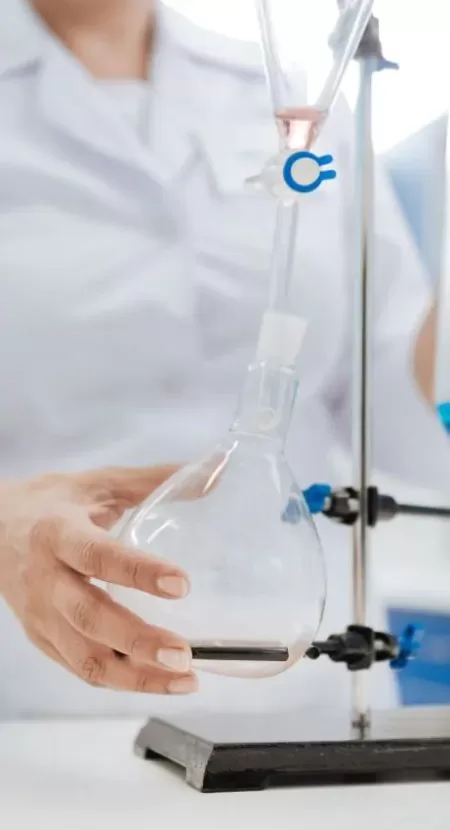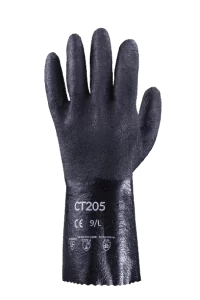Chemical Gloves for Chemical Industry
A reliable and consistent industry glove supply is fundamental to sustaining a secure work environment in the chemical sector. In the demanding landscape of the chemical industry, ensuring the safety of your dedicated staff navigating hazardous substances is our top priority. A cornerstone of this commitment is using chemical protective clothing and gloves, indispensable guardians against chemical harm. Picture this – the potential risks of exposure to hazardous chemicals during cleaning, manufacturing, and energy production. The proper chemical gloves become our frontline defenders, essential in preventing severe outcomes like chemical damage. This underscores the indispensable role of chemical-resistant gloves and protective clothing in these critical settings.
Why Workers Need Chemical-Resistant Gloves in Chemical Industry
Hazards in chemical plant operations
➤ Workers are susceptible to chemical exposure in day-to-day activities that involve handling and mixing of fluids.
Exposure to harmful chemicals
➤ Long-term exposure to substances like ammonia, cleaning chemicals, paint, glue, and petroleum products result in cumulative damage.
Risks of confined space
➤ Working in limited space causes oxygen deficiency, the possibility of electrocutions, and even ventilation issues.


Why Choose Our Chemical Gloves As Your Solutions
Increase efficiency
➤ Our protective clothing is made of professionally selected materials that provide high breathability for working in confined spaces.
Unbeatable Protection
➤ Our protective clothing provides full body coverage against chemical sprays and splashes for working in chemical plants.
Ultimate comfort
➤ Our protective clothing is made of professionally selected materials that provide high breathability for working in confined spaces.
Standards & Quality
➤ Our protective wear complies with CE standards.
Recommended Chemical Resistant Gloves for Chemical Industry
Frequently Asked Questions Regarding Chemical Gloves
What is a chemical glove?
A chemical glove is a personal protective equipment (PPE) that protects your hands from harmful chemicals, including acids, solvents, and oils. They are typically made from materials like nitrile, neoprene, or butyl, which are resistant to various chemicals and provide excellent grip in both wet and dry conditions. Chemical gloves come in different length, thickness, and liner to provide varying levels of protection and dexterity for specific tasks.
What is the purpose of chemical gloves?
The main purpose of chemical gloves is to act as a barrier between your hands and harmful chemicals. They protect your skin from:
- Direct contact: This prevents chemicals from contacting your skin, which can cause irritation, burns, or even absorption of harmful substances.
- Permeation: Even if a chemical doesn’t seem to soak through the glove directly, some chemicals can slowly permeate the material over time. Chemical gloves slow down this permeation, giving you time to remove them before significant exposure occurs.
- Degradation: Certain chemicals can break down the material of the gloves themselves. Chemical gloves are designed to resist degradation by specific chemicals for a certain period, allowing you to handle them safely.
What are chemical-resistant gloves made of?
Chemical-resistant gloves are made from various materials, each offering different benefits and levels of protection against specific chemicals. Here are some of the most common ones:
- Nitrile: Nitrile is a synthetic rubber that protects against a wide range of chemicals, including acids, bases, oils, and solvents.
- Neoprene: Another popular option, neoprene offers good resistance to acids, bases, oils, and greases. It’s also waterproof and abrasion-resistant, making it suitable for wet or messy environments.
- Butyl: Butyl is known for its exceptional resistance to strong acids, ketones, and aldehydes. Butyl gloves are ideal for handling harsh chemicals but may not be the best choice for oils and solvents compared to nitrile or neoprene.
- Viton: Viton is the king of chemical resistance, offering superior protection against various chemicals, including highly corrosive acids, solvents, and oils.
Who should use chemical-resistant gloves?
Chemical-resistant gloves are essential for various professions due to potential chemical hazards. Here are some key users:
- =Lab workers (chemists, biologists)
- Industrial workers (chemical plants, oil and gas)
- Healthcare workers (doctors, nurses)
- Cleaning and sanitation personnel
- Construction workers (handling specific materials)
- Agricultural workers (applying pesticides, etc.)
- Electronics and automotive industry workers
How are chemical protective gloves classified?
The EN 374-1 standard uses a letter system (A, B, and C) to classify chemical gloves based on the number and breakthrough times of specific test chemicals:
- Type A: This indicates the highest level of protection. Type A gloves offer a permeation resistance of at least 30 minutes for a minimum of six test chemicals.
- Type B: This is a medium level of protection. Type B gloves provide a permeation resistance of at least 30 minutes for a minimum of three test chemicals.
- Type C: This is the lowest level of protection within the EN 374-1 standard. Type C gloves offer a permeation resistance of at least 10 minutes for at least one test chemical.
Get Chemical-Resistant Gloves Built for Chemical Industry Now
Don’t let chemical hazards slow you down. For professionals in the chemical industry, safeguarding your hands is paramount. Excia‘s high-performance chemical-resistant gloves provide the protection you need to tackle any task confidently. Invest in your safety, invest in your productivity. Browse our selection of chemical-resistant gloves today!





